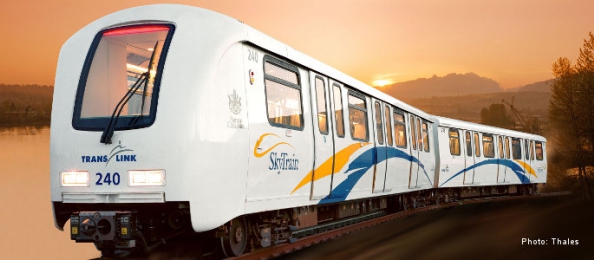Fighting Climate Change
Thales is responding to the major issue of climate change by implementing a strategy of at-source reduction of CO2 emissions, helping to raise awareness of climate-related issues through a number of programs and partnerships, and promoting products and services that support the emission-reduction initiatives of its customers and society at large.
For a number of years, Thales has been taking steps to reduce its carbon footprint. Since the Group began measuring its emissions on the basis of the Greenhouse Gas Protocol and set emission-reduction targets, awareness of the impacts of its activities on climate change has grown and a number of new opportunities have been identified.
To reduce its CO2 emissions, the Group has launched ambitious programs to reduce its energy consumption, particularly fossil fuels, renovated buildings to more stringent ecological standards, and changed consumption habits.
Efforts have continued to encourage the use of the latest information technologies and promote transport audits and communication campaigns to show employees the benefits of using alternative modes of transport.
The Group is also paying particular attention to its industrial processes, particularly those that use fluids with a high global-warming potential.
Using technology to fight climate change
Throughout the world, customers of Thales are facing a range of environmental challenges. As a major player on the security market and in air, rail, and road transportation, the Group is using its technical expertise and capacity for innovation to help its customers address these challenges.

Transport and environmental challenges
In today’s increasingly urbanized world, creating sustainable conditions for urban mobility and inter-city travel is an important way of reducing CO2 emissions. For more than 30 years, Thales has been helping city authorities and large-scale transport network operators to meet the increasing demand for more-efficient means to travel. The challenge is clear: convince commuters to switch modes of transport by offering them multimodal options that are cheaper, quicker, and more convenient. Thales systems help to make infrastructure operators more efficient while improving the service provided to customers. The fare collection systems deployed by Thales allow passengers to use a single ticket to travel on different modes of transport in a given region or even across an entire country.
Solutions provided by Thales also allow rail operators to cut their energy consumption by modifying speed profiles according to operational requirements or reducing energy-intensive stop-and-start cycles, for example. Thales leads the field in automated train control systems based on CBTC (Communications-Based Train Control) technology, which significantly increases the number of trains that can operate on a given line, and thus helps make urban rail systems more efficient.
Road-charging systems for trucks, such as those introduced in Germany, Switzerland, and Austria, help regulate road traffic flows and provide revenues for vital infrastructure upgrades. Thales is also a recognized expert in highway supervision and information systems designed to improve the driving experience.
With air transport volumes set to expand significantly in the coming years, there is a clear need for the air transport sector to reduce its environmental footprint. Thales is a market leader in avionics and air traffic management solutions and manages research and technical development projects with a view to enhancing aircraft operations.
Thales is a founding member of the Clean Sky European program, which aims to reduce CO2, nitric oxide, and noise emissions of aircraft between now and 2020. Thales is coordinating one of the program’s main research topics, “Systems for Green Operations,” which aims to reduce aircraft energy consumption through trajectory management, notably during the takeoff and landing approach phases of flights.
Thales is also a key player in the European program SESAR (Single European Sky ATM Research), which is addressing the challenges associated with the growing demand for air travel and aims to improve flight safety while reducing the energy consumption of commercial aircraft.
| Initiator | Thales Group |
| Project start | December, 2011 |
| Status | ongoing |
| Region | France |
| Contact person | Sandrine Bouttier-Stref |
| Awards | - |
Project benefit
- Reduction of CO2 emissions
| Anti-Corruption | - |
| Business & Peace | - |
| Development | - |
| Environment | X |
| Financial Markets | - |
| Implementing UNGC Principles in your Corporate CSR Management | - |
| Human Rights | - |
| Labour Standards | - |
| Local Networks | - |
| Advocacy of global issues | X |
| Business opportunities in low income communities/countries | - |
| Project funding | - |
| Provision of goods | - |
| Provision of services/personal | - |
| Standards and guidelines development | X |
Smarter cities
Globalization is intensifying competition between cities as well as other economic players. At the same time, with a broader understanding of climate change and the risks associated with depleting natural resources, cities are reassessing their growth models and development strategies.
Thales has been working with some of the world’s largest cities for several decades now, playing a central role in the transformation processes and helping to build the smarter urban communities of tomorrow. The Group designs and develops interoperable supervision and hypervision solutions that provide operators of transport systems, energy networks, and major urban infrastructure with a real-time overview of key events and parameters. Operators are able to optimize flows and configurations, manage equipment status, and allocate resources to enhance security, boost operational efficiency, save energy, and speed decision-making processes, thereby improving the quality of life of local residents.
Monitoring the climate
Thales is a key player in space-based Earth observation programs, providing high-resolution optical and radar imaging systems that promote a better understanding of climate change and more-effective environmental monitoring. Its systems monitor patterns of ocean circulation, provide images of the planet and its oceans, and also collect essential information for predicting climate change and monitoring vegetation.
Thales systems provide unprecedented quantities of information based on imagery of the globe and hyperspectral sounding of the atmosphere, helping climatologists better understand how the climate evolves over time.
The CDP
Since 2005, Thales has disclosed full details of its climate change strategy on the Carbon Disclosure Project (CDP) website. The CDP aims to assist investment decisions taken by its members by informing them of the effects of climate change on companies.
Promoting engagement
In addition to reducing greenhouse gas emissions from its own activities, Thales encourages its partners to take a responsible attitude toward climate issues. For example, Thales chairs, or is a member of, several national and international working groups related to the issue of greenhouse gases. Thales is also one of several industry partners that supports the university chair in greenhouse gas emissions monitoring, inaugurated in France in December 2011.
Whenever critical decisions need to be made, Thales has a role to play. In all the markets we serve – aerospace, space, ground transportation, security and defence – our understanding of the Critical Decision Chain helps customers to decide and act in a timely fashion and obtain the best outcomes.
World-class technologies and the combined expertise of 65,000 employees in 56 locally based country operations make Thales a key player in assuring the security of citizens, infrastructure and nations.
Each of the markets that Thales serves — aerospace, space, ground transportation defence and security — plays a vital role in society. Thales operates as a single organisation, drawing on the talent and technologies of the entire Group to act as prime contractor, systems integrator, equipment supplier and value-added service provider on both civil and military programmes.
Write a comment about this page
Your comments are provided by your own free will and you take sole responsibility for any direct or indirect liability. In order to maintain the highest discussion quality, all comments will be reviewed by our editors. You hereby provide us with an irrevocable, unlimited, and global license for no consideration to use, reuse, delete or publish comments in accordance with our Community Guidelines.
About Us // Privacy Policy // Copyright Information // Legal Disclaimer // Contact
Copyright © 2012-2018 macondo publishing GmbH. All rights reserved.
The CSR Academy is an independent learning platform of the macondo publishing group.









